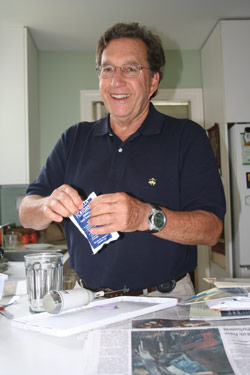
Russell Morgan, who reduced his weight by 60 pounds, now eats a nutritious, low-calorie diet (without being "on a diet") and gets regular exercise.
Photos: Russell Morgan

Russell Morgan changed the way he eats and exercises, and reduced his weight by 60 pounds—with healthy habits he can keep for a lifetime. You can, too.
By Christopher Klose
Over a recent eight-month period, public health expert Russell Morgan, 66, of Chevy Chase, Md., dropped 60 pounds from his five-foot, nine-inch frame, going from 250 to 190 pounds. He spoke with NIH MedlinePlus magazine about how he did it, and what he does to maintain his weight.
What motivated you to lose weight?
Russell Morgan: One evening at dinner with friends, I suddenly noticed my pants were too tight. And I was sweating and couldn't enjoy the food. My body was sending me a message: Get rid of the weight. That was a transformative moment.
How did you feel?
Russell Morgan: Finally, I was in the mood to change. That was key. Nothing's going to sell you on losing weight if you don't want to. Beyond wanting, however, you have to have the time, which I did. Most people don't.
Did you follow a process?
Russell Morgan: Yes, on my doctor's advice, I entered a weight management clinic at a local medical school. It included physician counseling and support group therapy managed by psychologists and psychiatrists to understand the behavioral factors influencing obesity and people's eating habits. I began a nutritious, low-calorie liquid protein diet, weighed myself daily, and kept a journal of everything I ate. And I began to exercise regularly, beginning with walking with family and friends. As I approached my target weight, guided by the clinic's dietitian, I began transitioning back to regular foods. With my weight down, my own doctor took me off the high blood pressure medicine I'd been on for years.
Were you pleased with your progress?
Russell Morgan: Yes, as a scientist, I had confidence in the system and it was helpful to learn what to expect. I wanted to understand the underlying biology and psychology of my obesity. Self-understanding is a very important key to weight control.
What about your family?
Russell Morgan: You want them on "your" side, of course. They were very supportive, but skeptical; then surprised when I became compulsive about losing weight. Tracking lost pounds became a stimulus in itself. Best thing of all, I don't snore any more; my wife couldn't be happier!
What's your advice about obesity?
Russell Morgan: One thing about obesity, it's a chronic disease. But it's a disease you can do something about yourself. Losing the weight is easy. Maintaining your new profile is hard. Self-awareness and discipline are critical. But the reward is terrific. Everyone notices the difference, which makes you very proud of what you've accomplished.
Fast Facts
- About two-thirds of U.S. adults are overweight, and almost one-third are obese, according to the Centers for Disease Control and Prevention (CDC).
- Overweight and obesity are known risk factors for diabetes, coronary heart disease, high blood cholesterol, stroke, high blood pressure, gallbladder disease, osteoarthritis (degeneration of cartilage and bone of joints), sleep apnea and other breathing problems, and some forms of cancer (breast, colorectal, endometrial, and kidney).
- There are healthy ways to reduce your weight, increase your exercise, and improve your eating habits. They all start by talking with your health-care provider.
- Restaurant food portions have mushroomed in size over the past 20 years; we're eating out more often, and eating more when we do.
To Find Out More
Weight control
www.nlm.nih.gov/medlineplus/weightcontrol.html
WIN: Weight-control Information Network
win.niddk.nih.gov/
We Can! national program on children's weight, exercise, and diet
wecan.nhlbi.nih.gov
DASH diet (Dietary Approaches to Stop Hypertension)
http://www.nhlbi.nih.gov/health/public/heart
/hbp/dash/new_dash.pdf
